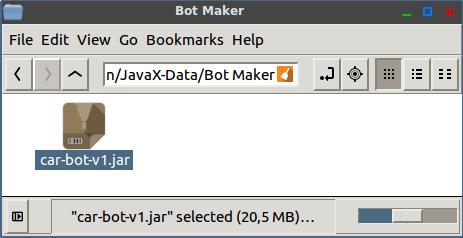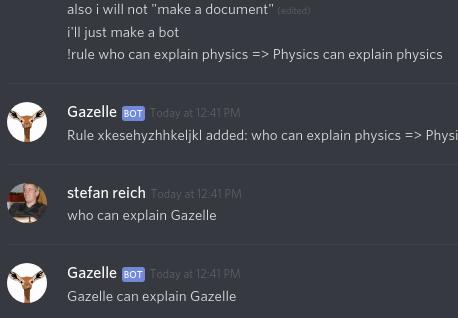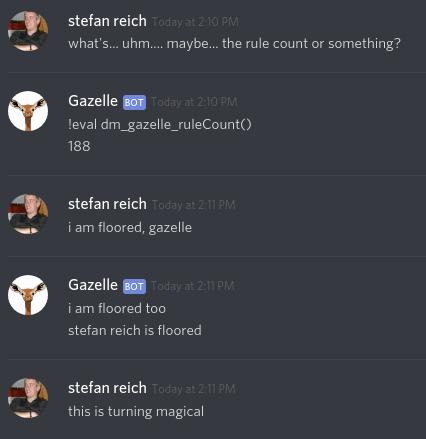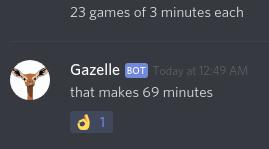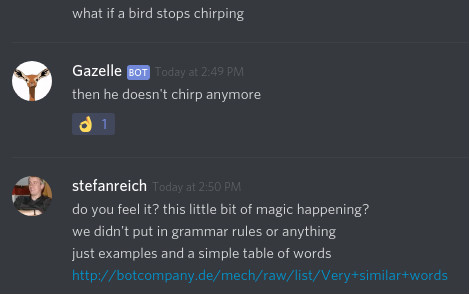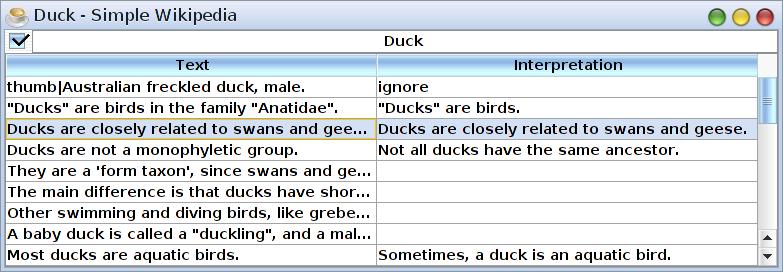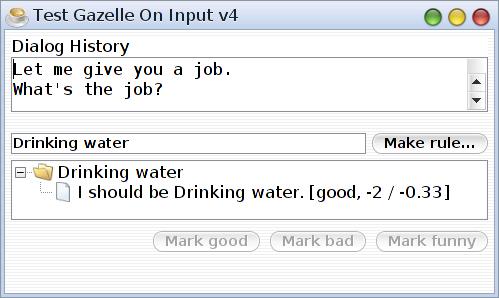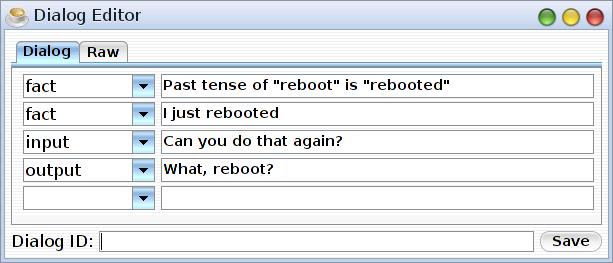From dialog to chat bot 101
(In a few steps, that is.)
What time is it? It's 5:30 Why did you say that? Because you asked me what time it is.
Bots now available 'standalone'
Gazelle
First professional bot being built
Not sure if I'm allowed to tell you more yet... :-)
My OS is really happy with 8 GB of RAM
...and any Windows installation. Enough space for AI experiments—and enough space for memory-hungry Firefox. Try it out yourself!
Accommodating human stuttering
Yes, it's all automatic. The original rule is just matching for "what's the rule count".
Coder muscle flexing :)
Sometimes I just have to do this—coming up with a really intelligent little solution for common coding questions that, oddly, don't seem to have an answer yet.
Like this one: How to find out efficiently whether a prefix of a string is contained in a tree set.
PS: Haha, now StackOverflow is saying they want to delete the answer. I was improving on another answer which apparently is not being deleted? StackOverflow is complete madness as I have said before.
Mini-investment needed
Sorry... I can't always turn water to wine. Need some grapes. Details.
I just made Gazelle scalable
10,000 rules shouldn't be a problem at all. We do want AGI, don't we?
Gazelle is offended
Gazelle's Auto-Math Module
Gazelle Learns
Come join us over at Discord.
New Discord Group
Analyzing Wikipedia
Gazelle growing
A new logic engine
A logic engine is what makes machines talk.
This new one I'm making is really impressive.
The new engine merges syntax and semantics; allows humans to teach the machine how to think easily; and it doesn't require a full model of the language in question (say, English).
Surely it needs a cool code name, right? How about... uhm... "Gazelle"? "Panther"? Goldfish? Rubber duck? Something!
Either way: Expect demos soon. Until then, enjoy the chewing gazelle.
Who smokes dope?
Input:
I visited the pope. He smokes dope.
Output:
I visited {the pope} [*1]. He [1] smokes dope.([*1], [1] and the curly braces mean that "he" points to "the pope".)
Ways to eat pizza
Matt Mahoney recently gave this little example of ways in which language is ambiguous:
I ate pizza with a fork. I ate pizza with pepperoni. I ate pizza with Bob.
I was inspired to make a program to interpret these different meanings of the word "with". I used the 3 lines as training examples, then made some new examples for testing.
My program is a logic engine that takes the following rules:
// Some reasonings that everybody will understand.
// Sorry for the curly braces, we have to help out the parser a tiny bit.
// First, the 3 different cases of what "pizza with..." can mean.
I ate pizza with pepperoni.
=> {I ate pizza} and {the pizza had pepperoni on it}.
I ate pizza with Bob.
=> {I ate pizza} and {Bob was with me}.
I ate pizza with a fork.
=> I used a fork to eat pizza.
// Now some more easy rules.
I used a fork to eat pizza.
=> I used a fork.
I used a fork.
=> A fork is a tool.
The pizza had pepperoni on it.
=> Pepperoni is edible.
Bob was with me.
=> Bob is a person.
// Some VERY basic mathematical logic
$A and $B.
=> $A.
$A and $B.
=> $B.
// Tell the machine what is not plausible
Mom is edible. => fail
Mom is a tool. => fail
anchovis are a tool. => fail
anchovis are a person. => fail
ducks are a tool. => fail
ducks are a person. => fail
my hands are edible. => fail
my hands are a person. => fail
The logic engine performs some analogy reasoning using the rules stated above. Note that most of the rules don't distinguish between variable and non-variable parts, this is usually inferred automatically.
That's it! Now we give the program the following new inputs:
I ate pizza with mom. I ate pizza with anchovis. I ate pizza with ducks. I ate pizza with my hands.
...and it comes up with these clarifications:
I ate pizza with anchovis. => I ate pizza and the pizza had anchovis on it. I ate pizza with ducks. => I ate pizza and the pizza had ducks on it. I ate pizza with mom. => I ate pizza and mom was with me. I ate pizza with my hands. => I used my hands to eat pizza.
So nice! It's all correct. Sure, nobody would say "the pizza had ducks on it", but that is the most reasonable interpretation of the rather bizarre input sentence after the program eliminated the other two options (ducks as a tool or ducks as a person).
If you remove the line that says ducks are not persons, the program will correctly add the interpretation "I ate pizza and ducks were with me."
Full program in my fancy language.
In addition to the results, the program also shows some lines of reasoning, e.g. failed lines:
Interpretation: I ate pizza and the pizza had mom on it.
=> I ate pizza.
=> the pizza had mom on it.
=> mom is edible.
=> fail
and successful lines:
Interpretation: I used my hands to eat pizza.
=> I used my hands.
=> my hands are a tool.
Why did I make a specific program for this puzzle? Well, it's not a special-purpose program really. It's a general-purpose logic engine that supports problems of a certain complexity. Like a child understands everything as long as it's not too complicated. The plan is to make increasingly more capable logic engines until we can solve everything.
The program itself is <100 lines (not counting rules and input), but of course it uses some powerful library functions.
New Module Preview
English to Rule
Input (plain English, not executable):
If something is heavy, it weighs many grams
This should be converted to this rule which is executable:
fact($something is heavy) => fact($something weighs many grams)
Actual program that does the conversion:
ai_ifToFactRule_2( "If something is heavy, it weighs many grams", litciset("it"), // pronouns litciset("something") // nouns )
As you see, the only customization the function requires is a list of pronouns and nouns.
Finally, we can test the new rule.
ai_applyFactToFactRules( "fact($something is heavy) => fact($something weighs many grams)", "John is heavy")
which yields:
[John weighs many grams]
![BotCompany [logo by sadietwiqs] BotCompany [logo by sadietwiqs]](https://botcompany.de/images/1102944)
